- Home
- Leslie Meier
French Pastry Murder Page 11
French Pastry Murder Read online
Page 11
“You could pick up something for lunch,” suggested Sue. “We’re kind of low on food—except for pâté de foie gras and Mariage Frères tea.”
“Okay,” promised Lucy, donning her plaid coat. “I’ll be back soon.”
Once outside, she noticed the streets were emptier than usual, but a few stores were open, including an ethnic grocery on the next block. She’d stop there on the way back, she decided, and get some couscous or stuffed grape leaves for lunch. But first, she was determined to get to the hospital and see Chef Larry.
It felt good to be out on her own, she decided, striding along the mostly deserted streets. Many businesses were shuttered, there were no taxis and no buses, and few people had bothered to go out. She thought it was a big improvement from a usual day, when the streets were packed with traffic and the sidewalks full of people, as she crossed the Pont de Sully to the Île Saint-Louis. This was a tony residential area, a small island east of the larger Île de la Cité, filled with hôtels particuliers, large private town houses, most of which, she guessed, had been converted into pricey apartments. It was peaceful here. The quaint streets were lined with trees, now producing tiny, fresh green leaves.
The Île de la Cité was busier, containing not only the Cathédrale Notre-Dame, the Sainte-Chapelle, and the Conciergerie, which attracted tourists from all over the world, but also the courts in the Palais de Justice, the police headquarters at quai des Orfèvres, and the hospital. Police cars were coming and going, no doubt due to the farmers’ demonstration. There also seemed to be more ambulances than usual, with their braying horns.
The lobby of the hospital was quiet, with only a few visitors. Nobody was manning the reception desk, which Lucy took as a very good sign. She marched right on past, took the elevator to the seventh floor, and stepped right out, disregarding the cop who was sitting in front of the door to Chef Larry’s room. He gave her a cursory glance, then returned his attention to his iPhone.
Lucy continued on down the hallway, past the nurses’ station, trying to think of a way she could get into Chef Larry’s room. Setting off a fire alarm came to mind, but that was terribly irresponsible, and if she got caught, she’d be in big trouble. Back home she’d try to chat up the cop and convince him she was Chef Larry’s sister or something, but she knew her mastery of French wasn’t up to the task. She was about to give up and go home when she saw a cleaner coming out of a closet, wearing a smock and pushing a mop.
The closet wasn’t locked, so she popped in and discovered a row of hooks holding smocks just like the one the cleaner was wearing. She slipped one on right over her coat. It made her look rather chunky, but she thought that made her disguise even more realistic. Her shoulder bag was a bit of a problem, but she didn’t dare leave it in the closet, in case she needed to make a quick exit. She tried shifting it around so it hung in front of her waist, and decided it made her look pregnant. A menopause baby, she thought with a grim smile.
There was also a wide array of cleaning tools and products to choose from. She grabbed a spray bottle of cleanser and a rag. Back in the hallway, she squirted some cleanser on a framed Impressionist print that was intended to brighten up the place, keeping an eye on the cop. They were the only two people in that stretch of hallway, at least for the moment. Then, unbelievably, the cop stood up and stretched, then ambled off in the direction of the lavatories.
In the blink of an eye she popped into Chef Larry’s room, where she was disappointed to find he was deeply unconscious, hooked up to a lot of tubes and machinery with blinking lights. She hadn’t expected this. She’d hoped he would be recovering nicely and would be able to talk. It was awful, absolutely tragic, to find a young man in this condition, but, she reminded herself, she didn’t have time for sympathy. She opened the locker, hoping to find his clothing, but it was empty. Of course, his clothing was in a crime lab somewhere. What about the drawer of his nightstand? Also empty. Her hands were shaking, and her heart was pounding. She had to get out of there before she was discovered. She’d been foolish to take such a risk, she thought, giving him a good-bye glance as she turned to leave. Much to her surprise, his eyes were wide open.
“What are you doing?” he asked.
“I came to see you,” she said, reaching for his hand and squeezing it. “There’s a cop outside, so I borrowed this cleaning smock.”
“They say I’m going to be okay,” he said.
“That’s great news,” said Lucy, wondering if he knew who had attacked him, and whether it would upset him if she asked. “Do you remember the attack?” she asked in a gentle voice. “I was the one who found you. I called the medics.”
“I don’t remember it at all,” he said. They tell me it’s normal after a traumatic event. You repress the memory.”
Lucy was disappointed. If only he were able to remember his attacker, he could clear her and her friends from suspicion. She also wondered if he was telling the truth, but didn’t want to press him. “Is there anything I can do for you?” she finally asked.
“Yeah,” he said. “Can you make a phone call for me?”
“Sure, but why can’t you do it?” asked Lucy.
He shook his head. “Not allowed. The cops took the phone.”
It was true. There was no phone on the nightstand, and she’d found no sign of a cell phone in her brief search.
“Okay,” said Lucy, reaching under her smock for her bag and producing a scrap of paper and a pen.
He gave her a phone number and told her to ask for Serge. “Tell him I need to see him,” he added quickly. They could both hear approaching footsteps and turned toward the door, which was beginning to open.
Lucy realized she was trapped and got busy with the rag, cleaning the sink in the corner of the room.
It wasn’t the cop, thank goodness. It was a nurse, and she spoke sharply to her in French. Whoever said French was a beautiful language hadn’t been chewed out by an officious nurse, that was for sure, thought Lucy, ducking her head and scurrying out of the room. The cop was coming back down the hall, and she smiled at him, hoping desperately the nurse would check on the welfare of her patient rather than chase her down the hall. The elevator doors were opening, and she hopped inside and was carried down to the lobby. There she went straight to the ladies’ room, ditched the smock and cleaning supplies. Congratulating herself on her foresight in keeping her coat and bag with her, she left the hospital through the lobby.
Once outside, she started to retrace her steps, heading home. As she walked, she studied the phone number Larry had given her. Why was it so familiar? She didn’t know any phone numbers in Paris, but for some reason this number was setting off chimes in her head. Maybe it was similar to a number back home?
Stunned, she stopped in her tracks. Of course! It was the phone number for the Cavendish Hotel. Chef Larry wanted to contact somebody named Serge at the Cavendish Hotel. Who was Serge? And why was he the one person Chef Larry wanted to contact? Only one way to find out, decided Lucy, reversing direction and heading toward the boulevard Haussmann.
Chapter Nine
It was a bit of a hike to the Cavendish, and Lucy stopped at the Vélib’ station outside the hospital, which was stocked with gray bicycles available for rental. She wasn’t sure how the system worked and was leery of inserting her credit card without understanding the charges, and she thought the bicycles themselves looked heavy and cumbersome.
“Go ahead,” said a voice, and she turned to see Richard standing beside her and wearing a big grin.
“I don’t think so,” said Lucy, smiling back. “It’s been a while since I rode a bike, and Paris traffic is really crazy.”
“It’s a great system. I use them all the time,” said Richard. “I’ll show you how it works.”
Lucy shook her head. “I think I’ll stick to shank’s mare, my own two feet.” She paused. “I suppose you’re here covering the general strike.”
“No.” He shrugged. “Believe it or not, I’m doing an investigative pi
ece on the French health system. I’ve got a meeting with some big-shot doctor who says it’s on the verge of collapse.” He shrugged again. “I suspect he believes he’s not getting paid enough.”
“Your suspicions are probably right.” Lucy laughed.
“So, do you want to get a bike? All you need is a credit card.”
“No, but thanks. I’m getting used to walking.”
“Paris is a great city for walking,” he agreed. “There’s always something to see. You should stay clear of the Champs-Élysées, though. These strikes can get violent.” He paused. “Where’s the rest of the gang?”
“Back at the apartment,” said Lucy. Noticing his questioning expression, she added, “I got restless. They’re great friends, but sometimes I need to be by myself.”
He nodded. “Well, take care.”
“I will,” said Lucy, giving him a little wave and starting off in the direction of the boulevard Haussmann. Richard was such a nice guy, and he’d certainly scored a great job, working for the Times. If only Elizabeth had a small portion of his enthusiasm for life in Paris.
Fortunately, her route was some distance from the demonstration on the Champs-Élysées, but she was aware that there were more flics about on the street and fewer pedestrians. Not even the general strike, however, seemed to discourage the motorists, who swarmed through the streets at breakneck speed, driving with little regard for the rules of the road.
At the Cavendish, Lucy found Elizabeth alone at the concierge desk, looking both terribly professional in the green Cavendish blazer and rather uneasy. “I’m always nervous when Jean-Claude goes on break,” she confessed.
“So your boss is now Jean-Claude? You must be getting on pretty well,” said Lucy.
“He’s been great,” said Elizabeth. “He keeps telling me that it’s good to have someone who can communicate so well with the Americans and the English, but I’m terrified of the French guests. I’m sure they think I’m an idiot and wonder what I’m doing here.”
“It’s a learning curve,” said Lucy. “I’m sure you’ll catch on pretty soon. One day, voilà, you’ll understand everything, as if you were born here.”
“It can’t come soon enough,” said Elizabeth. “Meanwhile, let’s pretend you’re a guest and I’m busy helping you, just until Jean-Claude comes back.”
“Fine with me,” said Lucy, seating herself gratefully in one of the curvy chairs provided for guests. “I really do need your help. Is there anybody here named Serge?”
“Serge d’Amboise? The assistant manager? Why do you ask?”
“I think he may know Chef Larry, that’s all,” said Lucy.
“Well, that’s him over there,” said Elizabeth, indicating a very tall, dark, and handsome man standing in front of the reception desk. Unlike the other employees, who were all wearing the Cavendish blazers, Serge was dressed in a beautifully tailored suit that emphasized his broad shoulders and slim waist. “You can ask him yourself.”
Lucy had to admit that Serge’s splendid appearance was rather intimidating, and she suddenly felt terribly self-conscious in her plaid coat. “I can’t just walk up to him and start asking questions,” said Lucy. “Can’t you introduce us?”
“Sure,” said Elizabeth with a shrug.
Lucy followed her daughter across the expansive lobby, noticing how Elizabeth always turned heads. It was true, she thought, that beautiful people had an advantage over ordinary folks, and she wondered if they knew it. Elizabeth simply expected everyone to give her the attention she believed she was due, and they usually did. No wonder she didn’t get along with Sylvie, who expected pretty much the same thing. There couldn’t be two queen bees in the same hive, and Lucy didn’t expect the two roommates to stay together much longer.
“Serge,” Elizabeth was saying as the tall man bent his head toward her, “I’d like you to meet my mother, Lucy Stone. Mom, this is Serge d’Amboise.”
“Enchanté,” said Serge, taking her hand. For a moment Lucy thought he might actually kiss it, but he contented himself with a gentle squeeze. “You must be very proud of your beautiful and accomplished daughter.”
“Of course, I am,” said Lucy. “This job is a wonderful opportunity for Elizabeth.”
“We think very highly of her here. She is so American, so fresh.”
“Fresh is the right word to describe her,” said Lucy, smiling, “but in America it has a different connotation.”
“Mom!” protested Elizabeth.
“What do you mean?” asked Serge, furrowing his brow. “I must know this. It is so hard to pick up slang and idioms.”
“Fresh can mean naughty,” said Lucy. “Sassy. My mother used to say, ‘Don’t be fresh with me, young lady,’ and then I knew I was in trouble.”
“Elizabeth is fresh like a spring morning. She’s not in trouble,” said Serge.
“That’s good to know,” said Lucy, tremendously pleased that Elizabeth seemed to be doing so well at her job. “I asked Elizabeth to introduce me because I think we may have a friend in common, Larry Bruneau.”
“Chef Larry? How do you know him?” asked Serge. “He is in hospital. Someone attacked him.”
“I was taking a cooking class from him. I was actually the one who found he’d been stabbed and called for help.”
“You saved his life. I am sure he is very grateful for that.”
“I was just at the hospital,” said Lucy, suddenly unwilling to admit she’d actually been in his room and had spoken to him. “They say he’s doing much better, but he’s still under police guard.”
“That’s for the best, I suppose,” said Serge.
“Maybe in a day or two he’ll be allowed to have visitors. I’m sure he’d be eager to see his old colleagues,” said Lucy, delivering Larry’s message in a roundabout way.
“Of course,” said Serge. “Perhaps I will organize a visit when he is well enough.”
Lucy wondered whether he was simply mouthing platitudes or if he actually cared about Chef Larry. And if he did care, was it because he was genuinely concerned about Chef Larry’s well-being, or because he himself was involved in the black market scheme at the hotel and was fearful that the hospitalized man might incriminate him?
“I’m sure he would appreciate it,” said Lucy, watching Serge closely and probing for some clue to his true feelings. “I suppose he’ll be in increased danger when he recovers enough to tell the police who attacked him.”
“Bien sûr,” said Serge with a nod. “It is a problem for him, whether to tell or not. Maybe he doesn’t know or remember.”
“If he can’t, or won’t, name his attacker,” continued Lucy, “my friends and I will remain under suspicion. I am here with seven others, and the police have taken our passports. We’re in limbo until this case is solved.”
“I am very sorry for you, but, bien entendu, you must cooperate with the police. You have no choice but to tell them everything you know. Believe me, crime is taken very seriously here, especially crimes against a person.”
“I understand that, and we’ve all been trying to cooperate, but the police don’t seem to believe us. They even searched our rooms and made a terrible mess.”
“Mom, you didn’t tell me that!” exclaimed Elizabeth.
“It’s true. When we got back from police headquarters yesterday, we found the apartment had been ransacked, completely tossed.”
A worried expression flickered across Serge’s face but quickly disappeared. “There are worse places to be detained than Paris, no? You must make the most of this time and enjoy our beautiful city.”
“It is beautiful, but I would enjoy my visit more if I knew for sure that I’d be able to return home on schedule. I have other children, other responsibilities,” Lucy said. “Is there anything you could tell me about Larry that would help?”
Serge seemed to withdraw, physically distancing himself the slightest bit. “What do you mean?”
“Was he in trouble in the past? I know he used to work her
e. Were there problems? Was he fired, or did he quit?”
“I don’t know. I think he left because he wanted to start his own business. He told me he didn’t like being told what to do.”
“Were you close friends?” asked Lucy. “Have you known him long?”
“No.” Serge shook his head. “Colleagues, I think that is the word. We worked together for a brief period, that is all.”
“You didn’t hang around together after work? Go for a beer?”
“Nothing like that,” said Serge, taking a step backward.
Lucy knew that time was running out. She couldn’t think of any way around it, so she just had to come out and ask. “I’ve heard rumors that Chef Larry was involved in the black market. . . .”
“Mom!” protested Elizabeth, embarrassed by her mother’s questioning.
Lucy ignored her. “And a lot of employees here seem to be from the Middle East, where there’s so much terrorist activity. It’s no secret that these groups traffic in the black market. Do you think there could be some connection and that’s why Larry was attacked?”
“I don’t know where you got these ideas, but you are mistaken,” said Serge, a note of warning in his voice. “I think perhaps you Americans are a bit paranoid about Muslims, but not every Muslim is a terrorist. The Cavendish Hotels have a strict policy of nondiscrimination, for both guests and employees. We do have a lot of immigrant workers. It’s the nature of the business. If they do their jobs well, they are not a problem. However, if their work is not satisfactory, we let them go.” He paused. “And now, I’m afraid I must go and attend to my duties. It was lovely to make your acquaintance, Mrs. Stone. And, Elizabeth, I think a guest wants your attention.”
Glancing at her daughter’s empty desk, Lucy saw a well-preserved woman of a certain age wearing a gorgeous fur jacket, tapping one red-soled Louboutin shoe. Lucy wouldn’t have recognized the brand, but Sue had bought herself a pair and had proudly showed them off after one of her shopping trips.

 Christmas Card Murder
Christmas Card Murder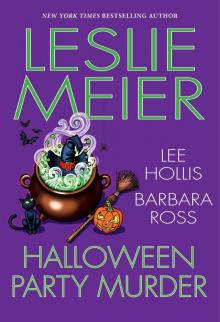 Halloween Party Murder
Halloween Party Murder 'Tis the Season Murder
'Tis the Season Murder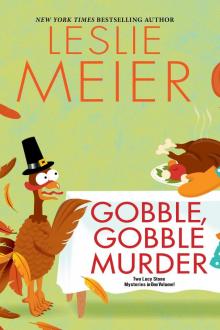 Gobble, Gobble Murder
Gobble, Gobble Murder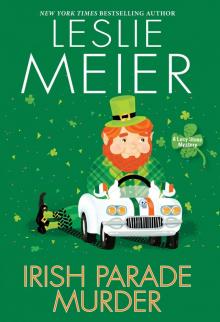 Irish Parade Murder
Irish Parade Murder Bake Sale Murder
Bake Sale Murder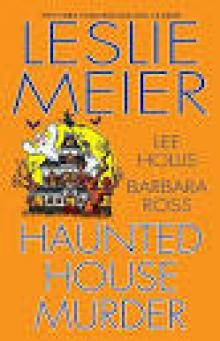 Haunted House Murder
Haunted House Murder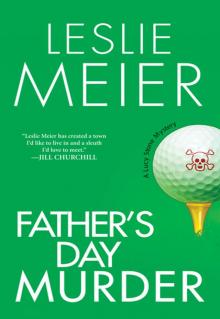 Father’s Day Murder
Father’s Day Murder Chocolate Covered Murder
Chocolate Covered Murder Tippy Toe Murder
Tippy Toe Murder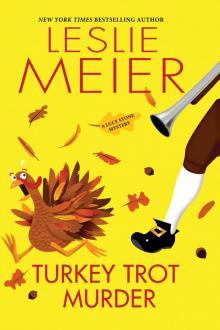 Turkey Trot Murder
Turkey Trot Murder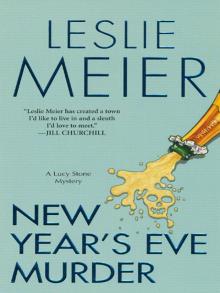 New Year's Eve Murder
New Year's Eve Murder Candy Corn Murder
Candy Corn Murder Mistletoe Murder
Mistletoe Murder LStone 20 - Easter Bunny Murder
LStone 20 - Easter Bunny Murder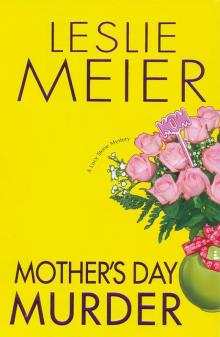 Mother's Day Murder
Mother's Day Murder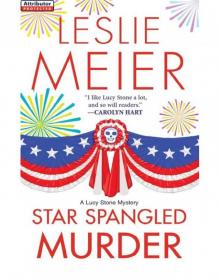 Star Spangled Murder
Star Spangled Murder Silver Anniversary Murder
Silver Anniversary Murder Wicked Witch Murder
Wicked Witch Murder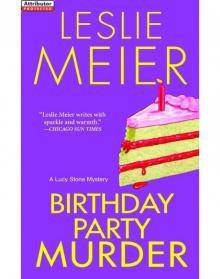 Birthday Party Murder
Birthday Party Murder Wedding Day Murder
Wedding Day Murder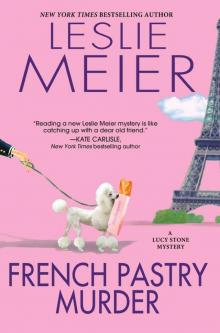 French Pastry Murder
French Pastry Murder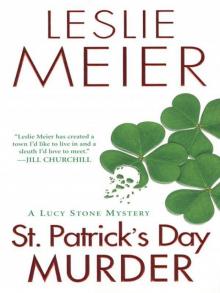 St. Patrick's Day Murder
St. Patrick's Day Murder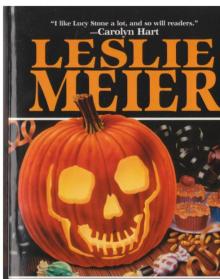 Trick or Treat Murder
Trick or Treat Murder Yule Log Murder
Yule Log Murder Holiday Murder
Holiday Murder British Manor Murder
British Manor Murder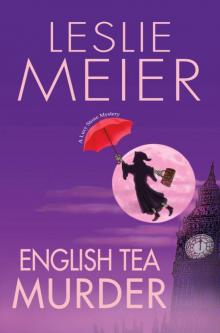 English Tea Murder
English Tea Murder